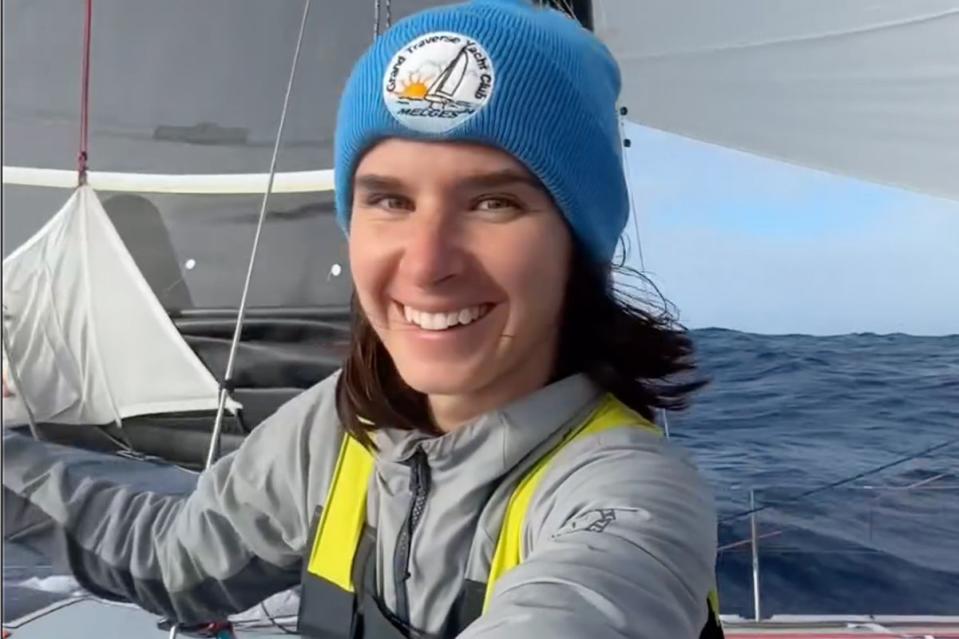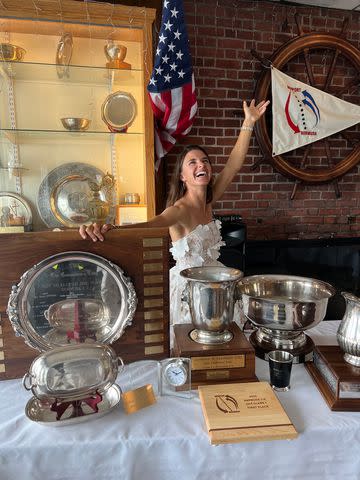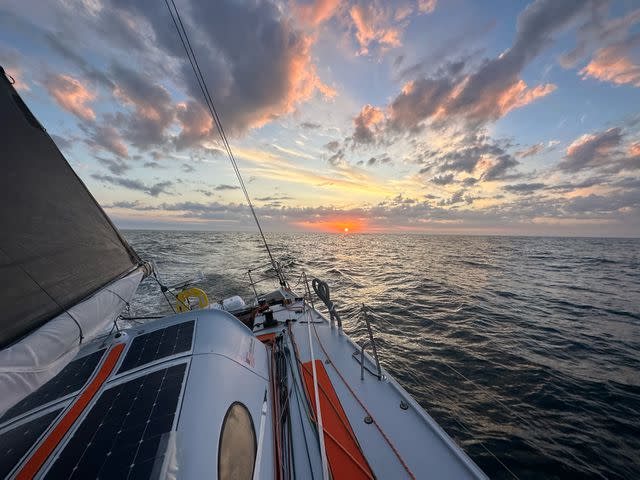Sailor Cole Brauer Is Making History as the First U.S. Female to Race Solo Across the Globe: 'It's a Dream Come True' (Exclusive)
In second place in the Global Solo Challenge, Brauer, 29, rounded Cape Horn off the Chilean coast on Jan. 26, 2024

COLE BRAUER OCEAN RACING
Cole BrauerFifteen-foot waves crashed over the deck of Cole Brauer’s 40-foot racing yacht, First Light, in the turbulent Indian Ocean as she tried to maintain her balance in the cramped cockpit in the stern.
The usually-trustworthy boat’s autopilot feature had broken down, forcing the 29-year-old skipper to steer the shaky tiller with her legs and man the lines of two sails with each arm while careening through one of the most treacherous stretches of the Indian Ocean. Solo.
“I'm trying to get rid of the sails because I can't control the boat,” the Long Island, New York, native tells PEOPLE, recalling the harrowing experience in December.
“But I can't leave the helm.” she says. “It's like driving a car on the highway and you don't have an accelerator or brakes. All you've got is this loose steering wheel. I was free-falling down waves, going so fast, I hit the maximum speed I've ever hit on this boat, just flying and then free-falling.”
Her oceanic roller coaster ride became extra challenging because she’d just injured — or possibly cracked — a rib when rough seas hurled her across the cabin earlier in the trip. “Every movement is this shooting pain,” she says.
But Brauer forged on. Using both arms and legs “like Mrs. Octopus,” she says, she took down the sails, strapped everything down tight and let the boat free float to allow her to fix the autopilot problem. “I fixed it,” she says. “It took me two days to resolve the issue.”
While her team back in the U.S. was monitoring the situation from afar via the Starlink satellite internet service, in that moment Brauer had no choice but to rely on herself. “It’s not like you can quit,” she says. “You're in the middle of the ocean. There is no quitting. No one's going to come and save you. So it’s like, ‘Suck it up. Fix the problem.’ In the end, it's just you. You have to keep moving forward.”
This can-do, persevere-at-all-costs attitude is what has made Brauer a rising star in the racing world. It’s also what has kept her going as she works toward an ambitious, history-making goal: being the first American woman to race solo around the world.
"We're doing it!" says Brauer, speaking about herself -- and First Light.
Of the 16 skippers in the inaugural Global Solo Challenge, a non-stop race that starts and ends in A Coruña, Spain, she is the only female and the youngest. And, at 5 feet and 100 lbs., she notes, the smallest — something she sees as an asset.
“To make it out here as a hundred-pound girl is a dream come true,” she says.
Starting on Oct. 29, 2023, Brauer and First Light, along with six other boats, set sail from A Coruña. She traveled down the west African coast, rounding South Africa's Cape of Good Hope, before heading to the Indian Ocean, where she rounded Cape Leeuwin in Australia before setting out across the Pacific toward South America.
On Jan. 26, she hit what is considered the “Everest” of her career by rounding Chile’s Cape Horn, surviving the notoriously deadly Drake Passage, the turbulent strait connecting the Pacific and Atlantic between Cape Horn and the South Shetland Islands, just above Antarctica.
Becoming a member of that exclusive club was no easy feat. “It's treacherous,” she says. “All sailors know it’s the hardest ocean in the world. The reason why the Southern Ocean is so respected by sailors is because there's so many people that lost their lives to the Southern Ocean.”
Over a period of about four months, she and the other skippers are covering 27,000 miles in the race. With a staggered start, the boats will finish on different dates. She expects to finish in early March.
As of press time, she was in second place behind Mowgli, helmed by French skipper Philippe Delamare. The third-place boat was more than 1,400 nautical miles behind her and hadn’t yet reached Cape Horn.
Being raised in a non-sailing family — her dad is a contractor and her mom once owned a small retail store that sold dance and exercise-wear — with no connections in the tight-knit, male-dominated world, she is proud of how far she has come.
This July, she raced in the Bermuda One-Two, not only winning the yacht race, but becoming the first female to do so. For her, it was a turning point in her career.
Before that, even though she had raced before, she says, "Nobody took me seriously. I was always just the 'girl in the van.'" (Back in the U.S., she lives out of a van, sometimes in Maine, where her parents live, or in coastal cities such as Newport, Rhode Island, where she prepped First Light, and Mystic, Connecticut.)
"Having the win come out of it said, 'She's not just messing around. We get what you've been do all these years.'"
At the same time, she says, "It shows we women can do anything that you guys can do. We don't have to keep following in your footsteps. We are the ones that are leading the charge now.”
The Calm After the Storm
PEOPLE spoke to Brauer via Zoom on in a rare moment of quiet, when she and First Light were about 400 miles northeast of the Falkland Islands in the south Atlantic, off the coast of Argentina.
“It was blowing 35 knots last night, and then that front went over me and now it's like glass outside,” she says, going on deck and showing off the 360-degree view of nothing but ocean, wet laundry draped over the deck and drying in the sun — and a bird floating on the surface nearby. “He's been with us” — meaning her and the boat — “for about three hours now,” she says. “He just sits right next to me and hangs out.”
The serenity gave her the chance to take a well-deserved breather, which included a full-body “sun shower” on deck using water from a solar-heated pouch instead of out of a bucket. “It’s a spa day,” she says with a laugh. “I've cleaned up a little bit. I'm eating, I'm trying to be a little more human today versus the last two months feeling like an astronaut.”

Serena Vilage
Cole Brauer in July 2023 after winning the Bermuda One-Two RaceSailing across the southern seas — the stretch from the Cape of Good Horn in South Africa to the Indian Ocean to the South Pacific through Chile with Antarctica to the south — “is like being on Mars, but much more wet,” she explains. “It's desolate, there's nothing around, and you are out in the middle of nowhere.”
Cold and violent, the storms, she says “just come and come and all you're doing is just trying to avoid them the best that you can. Sometimes you can do a really good job avoiding them, and then sometimes they just run you right over. Then you have to deal with the mess afterwards of cleaning up the boat and making sure that you're still alive.”
During her journey, she made it to Point Nemo in the South Pacific, the part of the ocean that’s farthest from any land. “The closest to humans that I was was the International Space station,” she says.
The calmer waters of the South Atlantic pose their own challenges. “You get into light winds like this, or no wind, and a lot of people go crazy,” she says. “But I'm really happy to be in this light wind, because it gives me a second to relax after dealing with hurricane force winds over and over and over.”
Related: Kate Middleton (in a Wetsuit!) Joins Sailboat Race with Team Great Britain
Netflix and Facebook Marketplace on the High Seas
For Brauer, a typical day during the race means waking up at sunrise — going by UTC or Coordinated Universal Time that's five hours ahead of Eastern Time.
“I'll get up, I'll walk outside and just check things and make sure there's nothing floating in the water behind me," she says. "You'll find random things off the boat that are dragging behind you after a crazy night.”
Among them, “trash dragging on the rudders,” she says, “and I have lines from the boat that are just off just dragging behind me.”
She gets situated for the day, first by checking the weather. “I always download that pretty much immediately as I get up in the morning to find out what's going to happen,” she says. “I'm downloading weather all the time, as much as I possibly can, especially with Starlink now.”
She meets virtually with her team every day, checking in with them in a group chat. This includes her weather router, her project manager and a medic who keeps track of her health.
She does a “little bit of an exercise to get the joints moving. There's no heat on the boat, so it's just damp, cold, and you feel decrepit."
Next comes breakfast, which is usually tea and oatmeal. “I'm actually running low on oatmeal. It's really depressing.”
She posts daily updates of her journey on Instagram and on her website colebraueroceanracing.com.
She cooks by heating up water in a jet boil, adding it to pre-packaged, freeze-dried foods. One of her favorite dinners is Peak Refuel’s sweet pork and rice.
When it’s time to go to bed, she curls up in her bed — a sleeping bag atop a beanbag tucked into the engine compartment, and four fleece pillows custom-made by her friend Jeff Samas of Straight Line Fabrication in Somerset, Mass.
Near her bed is her navigation station, with a computer screen in the center. “It has radar and the cameras,” she says. “I have one that faces outside. And so I can watch outside from my bed.”
When she’s not tussling with hurricane-like winds, she enjoys her down-time. “I read books a lot,” she says. “I listen to a lot of podcasts. Music is massive, I always have my speaker on. I think it helps with life.”
While Amazon obviously can’t deliver the chocolate or oatmeal she wants, she still has Netflix. “I've watched probably more Netflix movies than I have ever watched,” she says. “Right now I am rewatching rom-coms from the 2000s. Today’s movie is Pretty Woman.”
Mostly, though, she attributes keeping in touch with her trusted team and longtime friends to help her through loneliest moments — all thanks to technology.
“It has been great, definitely, to communicate with people,” she says. “I had a dinner party with a couple of my girlfriends for one of my girlfriend's birthdays, and they dressed up, and I ate pasta here, and we chatted, and they had dessert, and I ate the rest of my chocolate bar. That was the end of my chocolate bar.”
She also keeps in touch with her parents, who live in Maine. “I FaceTime my mom every morning,” she says.

Cole Brauer
Sunset in the South Atlantic in January 2024While floating in her “40-foot bubble” has allowed her to tune out most of the modern world, she can still take care of the tasks. “With Starlink, I was on the phone with my dad yesterday, because I want to buy a car,” she says. “I've been on Facebook Marketplace looking for a little Mini Cooper.”
She adds, “I'm having my dad go and test drive these little couple of grand Mini Coopers or whatnot. So that's the weird part about you're still living the same life, you were just doing it from afar.”
One of the perks of living on a boat in the middle of the ocean is the ability to marvel at some of the most stunning sunsets on Earth.
Or to just kick back, soak in the starry heavens above, and just be.
“I have this little black mat that I kind of lay out on,” Brauer says. “I bring my pillows and my sleeping bag and then sometimes I'll snuggle in right on the side of the cockpit.” She adds, “And that's so nice because in the tropics, you have the Milky Way and it comes down and it's like a waterfall and you can't tell where the ocean starts and the sky ends.”
Never miss a story — sign up for PEOPLE's free daily newsletter to stay up-to-date on the best of what PEOPLE has to offer, from celebrity news to compelling human interest stories.
For more People news, make sure to sign up for our newsletter!
Read the original article on People.

